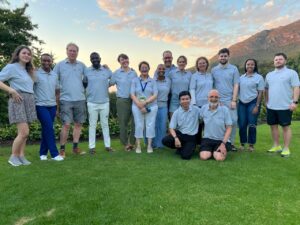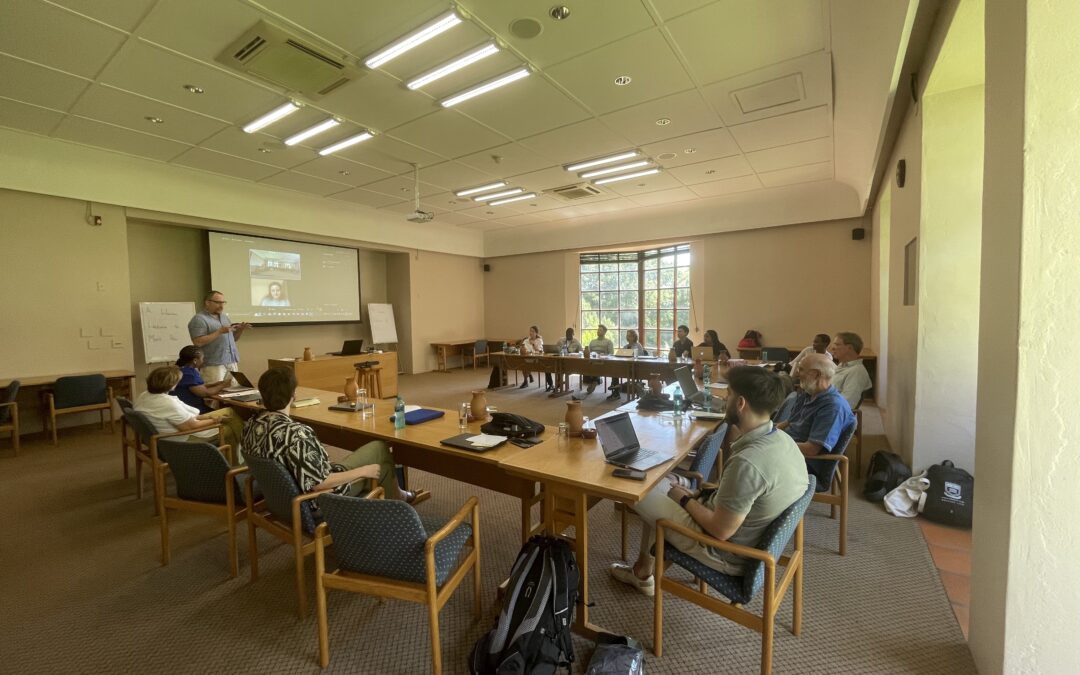The surge in global migration has ushered in an era of unprecedented cultural and linguistic diversity, underscoring the crucial need for comprehensive mental health care for immigrants. Migrants may be disproportionately susceptible to mental health disorders such as depression, anxiety and PTSD (posttraumatic stress disorder). Coupled with language and cultural barriers, accessing adequate health care poses a formidable challenge for many migrants.

Caption: Dr. Alina Forray (Romania), Miss Warona Mateane (SA), Prof, Ted Sanders (Netherlands), Dr. Rowan Madzamba (SA), Ms Annika Kreienbrinck (Germany), Prof Christine Anthonissen (SA), Dr. Asithandile Nozewu (SA), Prof Mike Mösko (Germany), Ms Saskia Hanft-Robert (Germany), Prof Barbara Schouten (Netherlands), Talha Topçu (Germany), Miss Kitso Setswe (SA), Ovidiu Oltean (Romania), KNEELING Mr Andrian Liem (China), Prof Leslie Swartz (SA)
The Department of Psychology at Stellenbosch University is a partner in a project entitled “Multilingualism in providing quality mental health care to migrants – needs, resources and practices” (#MIM2M) funded by the Volkswagen Foundation (VolkswagenStiftung). This ground-breaking international initiative is aimed at bridging language gaps for migrants needing mental health care, and is a collaborative effort in five countries – Germany, Romania, the Netherlands, China and South Africa. The project is designed to provide data to elevate treatment quality and patient satisfaction.
From 31 January to 4 February 2024, Stellenbosch University hosted the #MiM2M project meeting at the Mont Fleur Conference Centre, South Africa. All project teams consisted of representatives from a range of universities including Stellenbosch University, the University of Cape Town (UCT), the University of Hamburg, Germany, Utrecht University and the University of Amsterdam, the Netherlands, New York University Shanghai, China, and Babeș-Bolyai University, Romania. Most participants joined in person and were first-time visitors to South Africa and Stellenbosch University.
Delegates represented diverse backgrounds and disciplines including medicine, public health, demography, psychology and linguistics. Cross-pollination enabled the teams collectively to explore avenues for enhancing mental health care for migrants. The meeting transcended borders and bridged cultures in pursuit of a brighter, more inclusive future. Critical dialogues on multilingualism and mental health care for migrants took centre stage. A heart-warming Twitter post from German partners encapsulates the spirit of collaboration and camaraderie that permeated the gathering. https://twitter.com/MiM2M_project/status/1755206466670092678
As the South African team, we are keen to reach out to colleagues working in similar areas. Please address any queries to Dr Rowan Madzamba at rmadzamba@sun.ac.za.


